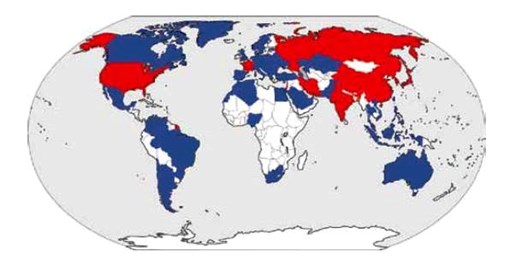The Global Nature of Space Activities
The United States, Russia, China, Europe, India, Japan, and Israel represent the most established space powers, each with indigenous orbital launch capability and a long track record of operating satellites. North Korea recently demonstrated its capacity to launch satellites, and South Korea is very close to being able to do so. To date, over 50 countries operate spacecraft in orbit and many companies around the world contribute directly to the global space industry.
Emerging space States recognize the importance of space systems for telecommunications, environmental monitoring, resource management, infrastructure development and national security, not to mention national prestige. With increasing interest in space and the proliferation of technologies enabling the utilization of space by a growing number of players, it is clear that greater cooperation on space governance is necessary.
The United States and Russia, responsible for ushering in the Space Age during the Cold War, remain the preeminent space powers in terms of budget and number of assets employed in outer space. The United States in particular has the largest space budget and is home to some of the largest space companies in the world.
This map shows current States with independent launch capability (red) and those States that have operated or are operating satellites of their own (blue).

States that have currently the capability to launch payloads into orbit include the United States, Russia, France (as majority shareholder in Arianespace, which also launches payloads for the European Space Agency), China, Japan, India, Israel, Ukraine, Iran, North Korea, and South Korea.
States that have operated or are currently operating satellites include: the Soviet Union (1957), the United States (1958), the United Kingdom (1962), Canada (1962), Italy (1964), France (1965), Australia (1967), Germany (1969), Japan (1970), China (1970), Poland (1973), Netherlands (1974), Spain (1974), India (1975), Indonesia (1976), Czechoslovakia (1978), Bulgaria (1981), Brazil (1985), Mexico (1985), Sweden (1986), Israel (1988), Luxembourg (1988), Argentina (1990), Pakistan (1990), Russia (1992), South Korea (1992), Portugal (1993), Thailand (1993), Turkey (1994), Ukraine (1995), Chile (1995), Malaysia (1996), Norway (1997), Philippines (1997), Egypt (1998), Singapore (1998), Taiwan (1999), Denmark (1999), South Africa (1999), Saudi Arabia (2000),United Arab Emirates (2000), Morocco (2001), Algeria (2002), Greece (2003), Nigeria (2003), Iran (2005), Kazakhstan (2006), Colombia (2007), Maritius (2007), Vietnam (2008), Venezuela (2008), Switzerland (2009), Belarus (2012), Hungary (2012), North Korea (2012), Poland (2012), Romania (2012), Austria (2013), Azerbeijan (2013), Bolivia (2013), Ecuador (2013), Estonia (2013), Peru (2013), Qatar (2013), Lithuania (2014). Note the increasing number of states in recent years.

 Share
Share